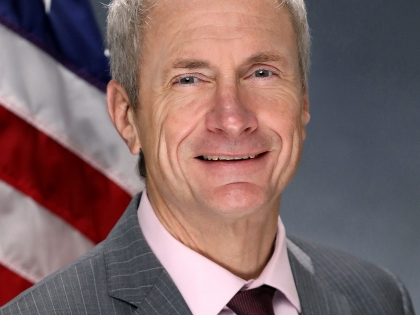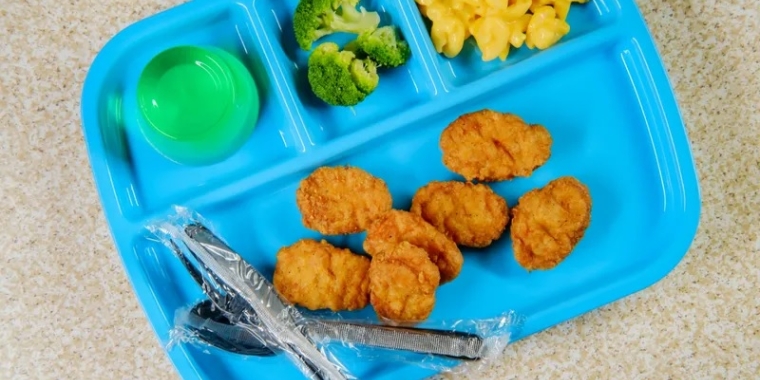
Evaluating $134 million of state budget set for free school meals in low income communities (WBEN)

(WBEN) - It was a partial victory for members of the New York State Senate and Assembly when Gov. Kathy Hochul announced $134 million of the state budget had been dedicated to free school meals for students in low income communities and populations.
Originally not a gubernatorial program and included in Gov. Hochul's original budget announcement, state leaders like Sen. Sean Ryan (D) fought hard to ensure some help would come for several low income districts across the state.
"It's a great victory for education," said Ryan of the addition to the state budget. "It will provide lunches for about 300,000 New York students. We all know that a kid who's hungry, can't learn. So starting just with the basic premise of we're gonna get a kid a lunch, that really moves us along."
Back in late March, Sen. Ryan was on-hand for a press conference involving school administrators, advocates, parents, and teachers for Gov. Kathy Hochul to fully fund the Healthy School Meals for All (HSMFA) initiative as part of this year’s state budget. This was an attempt to help out every student in every district across New York to be provided free meals during school days.
While this new addition to the state budget will not help every school district in New York, Sen. Ryan feels it's a great start towards eventually pushing for the state budget to aid schools in feeding students across the board.
"This will bring districts like Sweet Home, Amherst, Ken-Ton into the universal program," Ryan said. "We'll move forward and capture more districts, but from a Western New York perspective, this brings the vast amount of districts into the fold."
For Niagara Falls City School District Superintendent Mark Laurrie, who was also in attendance for the HSMFA push, this announcement as part of the state budget is much-needed news for districts like his in an effort to ensure no student goes to class on an empty stomach.
"We learned that through the pandemic, it's going to help kids. It's going to help performance, it's going to help behavioral issues, and it's what many, many of the students need. It's a bit unfortunate to say that, but it was a wise addition to the budget," said Laurrie of the new inclusion to the state budget. "We saw the great impact it had during the pandemic, and I'm glad that hurdle is over, and in place for our children in New York State."
Hosting the HSMFA press conference back in March was Springville-Griffith Institute Central School District and Superintendent James Bialasik. While Springville Schools do not qualify for this program now part of the state budget, he is still in support of the efforts put forth to help serve other schools.
"I think it's an excellent extra step, it's a great next step towards universality and having free meals for all students," said Bialasik of the state budget addition.
Bialasik has noticed the conversation surrounding free meals for school students across the board has gained a tremendous amount of traction in the past couple of months. He says just seeing the proposal in both of the one-house budgets before it was formally included in the final state budget says a lot.
"It says this is really important to people, and they're recognizing a lot of what we said at the press conference that we were able to host here in Springville, which was kids needs to be fed," Bialasik said. "It's difficult for them to learn if they're not well-fed, if they don't have good nutritious breakfasts and lunches. So I think this is a recognition that that's really important. Would we have liked to see universal free meals for all students? Absolutely, but like I said, this is another good step in the right direction."
With the new inclusion to the state budget for free school meals in low income populations, Laurrie hopes it can be a building block on the path to making sure that every district in the state will soon be able to serve all its students free school meals.
"There are very many factors within any school district that preclude a student, or students from getting that healthy meal choice at breakfast and lunch. It doesn't matter necessarily the affluence level, or lack thereof in a school district," he said. "I think it's just a good practice to take away another barrier to learning, and it helps everybody. If it all rolls out the way we hope and think it will, this is a really good part of the budget."
As Sen. Ryan explains, there are two benefits a bill such as this will provide for districts, students and families that are eligible in the state.
"One is the free lunch program is just a lot of paperwork for districts, and then the second thing is, parents income levels sometimes go up and down during the year. At the start of the year, you might not have been eligible for your children to have a reduced or a free lunch, but by mid-year you are, but there was no mechanism to re-enter the program," he said. "Also, a lot of families didn't want to be identified as being free lunch eligible. While their kids were eligible for the program, they didn't want to fill out the paperwork. They thought there was a stigma attached. So this really takes away the stigma, and makes it so this program can be more widely utilized."
Both Laurrie and Bialasik also agree with the premise that this bill as part of the state budget will take away the stigma that some students face when they get free meals in school, while others are able to pay for breakfasts and lunches.
"I think it just equalizes the playing field," Laurrie said. "It takes away a stigma, or a notification of who has what and who gets what. If it's applied the way we believe it will be applied, it's only a good thing."
"If you're not providing the free meals for all, I think you still are going to have students that are left out, and that carry that stigma of needing to get a free meal when others have to be paid. That's a big piece of what we're trying to eliminate, and just level the playing field, like we've tried to do in Springville this year through our own program," Bialasik added. "Unfortunately, it's not something that's sustainable in the long-term, but we will keep looking at different options to make sure that our students are getting the meals that they need on a daily basis for the minimal cost possible."
Bialasik says the program that Springville is running will continue through the end of this school year. He adds the district is exploring other options to find out what more, if anything, they can do moving forward.
"I'll remind everyone that this was based off of having USDA subsidies that were carried over through the pandemic. They allowed us to reallocate those funds in a way that they weren't able to be allocated previously, which was to offset the cost of meals for students," Bialasik explained. "We did take advantage of that opportunity, and that's how we were able to fund these meals through the end of the school year."
While this may not have been the end goal for lawmakers, advocates and school districts across New York just now, Sen. Ryan feels it gets every really, really close to ensuring free school meals for every student. He says it's a terrific program that can certainly be expanded upon in the future.
"Districts really learned during the pandemic there were way more food insecure families than they had realized, because more people needed food than had been participating in the Free Lunch Program, which led them to believe that people didn't want to fill out the paperwork because they didn't want to be identified as needing assistance," Ryan said. "We took away that hurdle, and that should mean more kids sitting in school classrooms will have a full stomach. And a full stomach makes it so you can learn."
Sen. Ryan feels confident state lawmakers will go into next year's budget and look at how this bill was implemented, and make the effort to build on it come next year's budget deadline.
Superintendents like Bialasik also share the same amount of confidence in local leaders pushing for free school meals for all.
"This was one budget one year, and hopefully the momentum will continue to grow for moving this forward in even a bigger way in years to come," he said.


